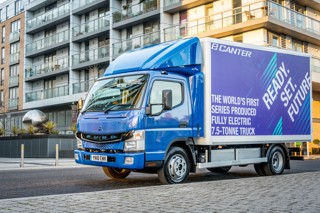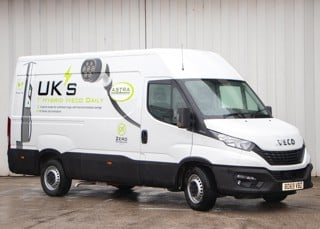A consultation on the phase-out of new diesel HGVs will be launched after the Government decided to ban the sale of petrol and diesel cars and vans.
The Prime Minister, Boris Johnson, announced yesterday (Wednesday, November 18) that new petrol and diesel cars and vans will not be allowed to be sold in the UK from 2030.
No decision has made on the future of diesel HGVs, with the Government instead saying it wants to consult with the commercial fleet industry.
“Logistics UK is urging Government to ensure there are practical alternatives to petrol and diesel HGVs before a phase-out of these vehicles is considered,” said Alex Veitch, general manager for public policy at the trade association.
“In order for the commercial sector to be able to deliver, Government should work with industry to develop a long-term pathway to decarbonisation, providing clarity on the technology and alternative fuels it supports so that manufacturers and operators can invest with confidence.”
However, perhaps unsurprisingly, electric truck manufacturer, Volta Trucks, called for the car and van ban to be extended to large commercial vehicles.
Chief executive officer of Volta Trucks, Rob Fowler, said: “We are disappointed that there is no mention in the proposals for the ban to extend to large commercial vehicles.
“Legacy internal combustion engine trucks are a disproportionately large contributor to greenhouse gasses and air pollution that’s proven to be a significant contributor to many thousands of premature deaths every year in our major towns and cities, where air quality is at its worst.
“Governments and legislators need to take a holistic approach to the climate change emergency we face and remove all polluting vehicles from our roads.
“Commercial vehicles form the lifeblood of city centre commerce, so society needs goods vehicles, but it also needs good vehicles: vehicles that are zero emissions.”
Veitch also highlighted issues around the electricity grid. “In terms of smaller vehicles, while logistics businesses are committed to switching to electric vans, the Government must introduce a fairer way of funding grid reinforcements and energy supply upgrades; currently, the onus lies on a business to fund upgrades to the entire local electricity hub if there is insufficient energy supply in the existing infrastructure to power its electric vehicle fleet,” he said.
“Without a resilient energy and charging infrastructure the switch to electric vehicles will be a pipe dream for businesses.”
Logistics UK welcomed the news that some hybrids will be excluded from the earlier ban date as they offer a bridging technology for van operators working in areas where access to charging infrastructure or electric vehicle model availability is limited.
Low Emission Freight and Logistics Trials
The Low Emission Freight and Logistics Trials (LEFT) report, which was published yesterday, points to a range of tried and tested solutions which it categorises as ‘Revolution’, ‘Transition’ and ‘Evolution’ technologies depending on the potential contribution to the net zero agenda
- Revolution technologies include battery electric vehicles (BEVs).
- Transition technologies include range-extended electric vehicles; dedicated gas vehicles and hydrogen/gas dual fuel vehicles.
- Evolution technologies include lightweight & aerodynamic trailers and trailer kinetic energy recovery systems (KERS).
The trials found that there is a wide range of revolutionary, transitionary and evolutionary technologies and alternative fuels that can all help to decarbonise commercial vehicles and road freight both in the next few years and out to 2050.
The BEVs and range-extended electric vehicles (REEVs) achieved significant emission reductions across almost all cycles and assessment criteria and all of the other technologies achieved improvements in at least some.
The trials were part of a £20 million government-funded programme (2017-2020) to cut emissions and improve air quality by focusing on emissions-busting technologies for trucks and vans. An additional £12m was contributed by private sector trial participants.
In these industry-led trials, everything from renewable hydrogen fuel and battery electric trucks through to biomethane fuel, kinetic energy recovery systems and even lightweight and aerodynamic trailers have been put through their paces.
They have been trialled in all driving operations to show how these low and zero emission alternative technologies can make a difference and to encourage their widespread introduction to UK fleets.
The funding was delivered by the Office for Low Emission Vehicles (OLEV) and Innovate UK, with extensive data management and analysis from the trials carried out by TRL supported by LowCVP and Millbrook.
Eight of the funded consortia completed the trials.
The programme allowed the emissions and energy performance of the LEFT technologies, and the practicalities of their in-fleet integration and implementation, to be compared with equivalent conventional diesel-powered Euro 6/VI vehicles.
LowCVP managing director Andy Eastlake said: “We’re seeing an acceleration in the rate of innovation towards lower emissions in the freight sector but there’s still a long way to go and we still need to understand the best technical options for different uses.
“The LEFT programme has significantly added to our understanding of the different options and has shone a light for fleet managers on the directions they can take now to cut emissions.
“It’s clear that this Government backing for trials of technology development projects has been instrumental in encouraging innovation and private-sector deployment of low emission vehicles and fuels that otherwise would not have happened.”
Justin Laney, general manager for fleet at the John Lewis Partnership, and a LowCVP Board member, which hosted and contributed to the trials, said: “Innovate trials are a highly effective catalyst for new technologies.
“The LEFT initiative has generated the really robust and valuable insight that is needed to guide decision making in the complex area of sustainable road freight.”
To download the LEFT report, click here.























Login to comment
Comments
No comments have been made yet.